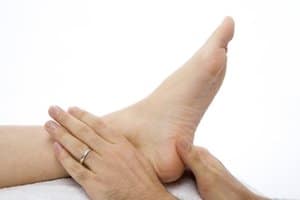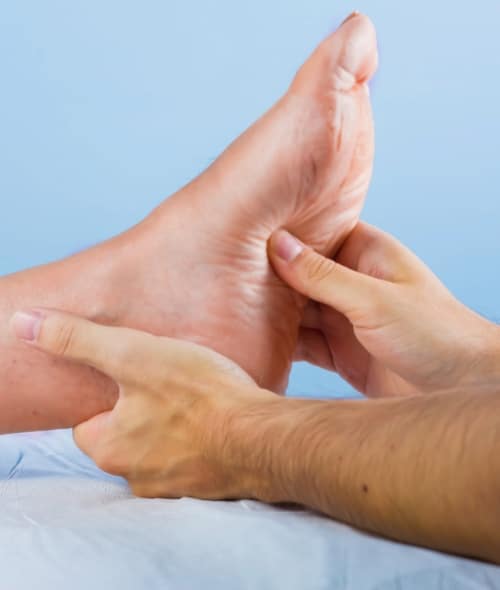
Heel Pain Treatments, Pittsburgh
Plantar fasciitis affects over 5% of the population. That’s 5 million Americans suffering with heel pain
If you wake up in the morning and on the first steps of the day are excruciating with pain in heel, if you work on concrete or stand for long periods of time, you may have plantar fasciitis.

If daily activities cause pain in the heel here are some simple home tips to treat Plantar Fasciitis, Cranberry Twp.
Which signs and symptoms accompany plantar fasciitis?
Plantar fasciitis normally causes a steady increase in discomfort that is typically felt near the heel. Occasionally, the pain can come on suddenly after skipping a step or jumping from a height. When you first wake up in the morning or after prolonged periods of inactivity, the pain is usually the worst. It is called “first-step pain” for this reason. The level of discomfort may occasionally decrease with daytime activity or after warming up, but it may also worsen after extended or strenuous exertion. Additionally, wearing bare feet or shoes with little support may make the discomfort seem more severe.
Treating Plantar Fasciitis
In general, the length of the treatment may increase with the duration of the symptoms and the intensity of the pain. High-demand athletes could also need a lengthier course of treatment, such as cross-country or marathon runners.
Treatment options for plantar fasciitis include:
Physical therapy and stretching
One of the finest remedies for plantar fasciitis is stretching. The plantar fascia and Achilles tendon should get special attention when stretching. A physical therapist can demonstrate stretching routines that you can practice daily at home. In addition to stretching, the exercises can strengthen the muscles in your lower legs, which will aid in stabilizing your ankle.
Wearing sturdy footwear
Put on a pair of supportive, solid shoes. Avoid wearing flip-flops, sandals, and other flat shoes without an integrated arch support. Don’t go about in bare feet.
Shoe inserts or orthotics
You can add extra arch support to your shoes by adding inserts. Your healthcare professional may advise pre-made inserts that you can purchase over-the-counter or specially-made orthotics that are molded to your foot’s specific form.
Tenotomy: using a percutaneous needle
Your doctor will insert a needle into your plantar fascia via your skin during a percutaneous tenotomy. The area receives more blood than usual from your body, which encourages the plantar fascia’s natural ability to heal.
Plantar Fascia Home Treatment:
Every morning before you even take one step out of bed…STRETCH! Using a rolled up towel or a belt around the ball of your foot, straighten your knee and bend your “toes to your nose”
Reduce inflammation, swelling, and pain by applying and ice pack ( or frozen peas or corn) to the painful area on the bottom of your heel.
NSAIDS (Nonsteroidal antiinflammatory pain medication) like ibuprofen or naprosyn may help temporarily.
Arch supports (hard, not gel) will help support the bones and muscles of the foot.
Cut back on your training routine, you may be logging too many miles.
If these don’t work in 2 weeks, call your podiatrist!
Call Beaver Valley Foot Clinic
More Plantar Fasciitis Treatments :
Physical therapy helps some people but for some it either doesn’t help, or makes it worse.
Night Splints help some people. they may be awkward to sleep in though.
Custom orthotics – I prefer plaster molds over stepping in foam.
If these conservative measures fail, it’s time to ramp up your heel pain treatments:
A local injection of corticosteroid to reduce the painful local inflammation. This is often very effective, but can be a bit painful (for 2 seconds-it’s worth it!)
ESWT- Extracorporeal Shock Wave Therapy, in which pressure waves in the form of sound waves as shock waves are directed via ultrasound guidance to the area of maximum tenderness in your plantar fascia. With experienced practitioners over 90% of thye most treatment resistant plantar fasciitis can resolve.
Surgery should be a last resort, as there are longterm considerations and many studies site only a 50% sucess rate
READY TO SCHEDULE AN APPOINTMENT?
Call us today 878-313-3338 to schedule at any of our four Podiatry Clinics in Beaver, Butler, or Allegheny County locations, including Podiatry offices Moon Township, Ambridge, Cranberry Township’s full service Podiatric office and our newest Foot Clinic, Beaver, PA
Call now to talk to a foot care specialist 878-313-3338 ( FEET)
